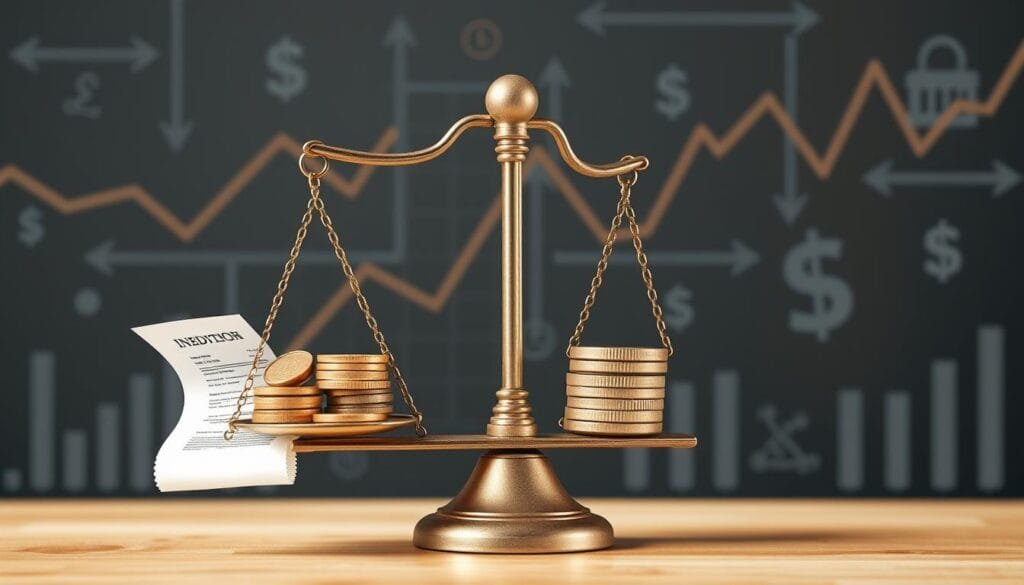ביטוח נכות הוא דרך חשובה לשמור על הכנסתך במקרה של מחלה קשה או פציעה שתמנע ממך לעבוד. זה כמו רשת ביטחון, שמעניקה לך חלק מהכנסה שלך, כך שתוכל להמשיך לשלם את חשבונותיך גם כאשר אינך יכול להרוויח כסף. לדעת כיצד עובד ביטוח זה הוא מרכזי לשמירה על ביטחון הכספים שלך במשך זמן.
עם פוליסת הביטוח הנכונה, תוכל להגן על עצמך מאתגרי הנכות לטווח ארוך. זה עוזר לך להמשיך לחיות טוב, גם בזמנים קשים.
מסקנות מרכזיות
- ביטוח נכות הוא חיוני לשמירה על הכנסתך ועל ביטחון הכספים.
- הוא מספק תכניות במקרה של נכות לטווח ארוך.
- הבנת סוגי פוליסות שונים עשויה לעזור לך לבחור את הכיסוי הטוב ביותר.
- ביטוח זה משמש כרשת ביטחון כלכלית במקרים של תרחישים בלתי צפויים.
- תכנון כלכלי אפקטיבי כולל על כלל אפשרויות ביטוח נכות.
הבנת ביטוח נכות
ביטוח נכות הוא מרכיב מרכזי להגנת הכנסה של אדם כאשר תחלוקות רפואיות בלתי צפויות מתרחשות. חשוב להבין את זה כדי לקבל החלטות חכמות לגבי הכספים האישיים והמשפחתיים.
מהו ביטוח נכות?
הגדרת ביטוח נכות היא חוזה שעוזר להחליף הכנסה אם מישהו לא יכול לעבוד עקב נכות או מצב רפואי. ביטוח זה עוזר למנוע קושיים כלכליים כאשר אינך יכול להרוויח כסף. זה מבטיח שתוכל עדיין לשלם על חשבונות חשובים ועלויות מחייבות.
סוגי מדיניות ביטוח נכות
הבנת הסוגים של מדיניות הזמינים עוזרת לאנשים לבחור את הנכון ביותר עבור צרכיהם. יש בעיקר שני סוגים:
- ביטוח נכות לטווח קצר: תוכנית זו מכסה הכנסה לטווח קצר, לעיתים קרובות מספר חודשים. זה עוזר לספק תמיכה כלכלית מהירה בזמן שהמשתפר מחלה או פציעה.
- ביטוח נכות לטווח ארוך: ביטוח זה נמשך לשנים רבות או עד הפרישה. זה מציע הגנה כלכלית נרחבת יותר כאשר אינך מסוגל לעבוד לזמן רב.
מדיניות קבוצתית עשויה להיות חלק מחבילת התגמולים במקום העבודה. אך, אנשים יכולים גם לרכוש מדיניות פרטית שמתאימה יותר לצרכיהם הייחודיים.
חשיבות ביטוח בריאות
ביטוח בריאות הוא חיוני לכל מי שרגעים לא יכול לעבוד. זה עוזר לאנשים להבין למה חשוב להגן על ההכנסה שלהם. דרך זאת, ניתן לשמור על יציבות כלכלית גם במהלך אירועים בלתי צפויים.
הגנה על הביטחון הכלכלי שלך
ביטוח בריאות הוא כמו רשת ביטחון. זה עוזר לכסות את עלויות המחיה שלך אם אינך יכול להרוויח כסף. אך רבים לא רואים את ערכו או חושבים על כמה הם תלויים בהכנסתם.
לאנשים עם משפחה שתלויה בהם, אובדן ההכנסה הוא דאגה גדולה. להביט על מה ששמרת ומה שעשוי להיות צורך עוזר לך להחליט על כיסוי.

שגיאות נפוצות בנוגע לביטוח בריאות
כמה מיתוסים מונעים מאנשים לקבל את הביטוח שהם צריכים. אחד מהם הוא השגה שזה רק בשביל עבודות פיזיות. אך, כל אחד יכול להיפגע, לא משנה מה העבודה שלו.
רעיון שגוי נוסף הוא לצפות לקבל יותר כסף מהגמילות. כללית תקבלו בדרך כלל כ-60% מה שהייתם מרוויחים. חשוב להבין את העובדות הללו כדי לראות למה כולם צריכים ביטוח לאובדן כושר עבודה.
ביטוח לאובדן כושר עבודה: הגנה על ההכנסה שלך
חשוב לדעת כיצד ביטוח לאובדן כושר עבודה עוזר לפני שמתחילים לקבל אותו. אתם משלמים חודשי לקבל כסף אם תושבת מונעת מכם לעבוד. כל מדיניות יש כללים שונים למתי התשלומים מתחילים וכמה זמן הם נמשכים.
איך זה עובד
לאחר שאתם מקבלים מדיניות לביטוח לאובדן כושר עבודה, היא משלמת לכם אם אתם לא יכולים לעבוד בגלל מונע. הכסף הזה עוזר לכם להישאר יציבים כלכלית עד שתוכלו לחזור לעבוד. הביטוח מכסה יותר ממשכורות שאבדו; הוא גם משלם על עלויות רפואיות והוצאות יומיומיות.
יתרונות מרכזיים לבעלי מדיניות
היתרונות של ביטוח לאומיות הם רבים ומשמעותיים. הפרקים החשובים כוללים:
- יציבות פיננסית בתקופות בהן אין עבודה
- כיסוי להוצאות רפואיות מתוך הנכות
- עזרה בהוצאות היומיומיות כדי לשמור על סטנדרטי החיים שלך
- מניעת חובות, מעניק לך שקט נפשי
- שמירה עליך ועל משפחתך בתקופות קשות

הבנת כל הדרכים בהן ביטוח לאומיות עוזר מציגה למה זה חשוב להגן על הכנסתך.
| תועלת | תיאור |
|---|---|
| יציבות פיננסית | שומר על הכנסה גם כאשר אינך יכול לעבוד. |
| כיסוי חשבונות רפואיים | משלם על עלויות בריאות הקשורות לנכות. |
| תמיכה בחיי היומיום | עוזר בתשלומי חיים יומיומיים כדי לשמור על חיים רגילים. |
| מניעת חובות | מונע בעיות פיננסיות על ידי כיסוי שכר אבוד. |
| ביטחון משפחתי | נותן ליקיריך שלך שקט ובטיחות. |
הבנת איך ביטוח נכות פועל מאפשרת לך לבחור בחוכמה לגבי בטיחות הכספית שלך.
מי צריך לשקול ביטוח נכות?
חשוב לדעת מי באמת זקוק לביטוח נכות כדי להגן על ההכנסה שלהם. קבוצות שונות כמו עובדים, אלה שעובדים בעצמם, ומקצוענים נתקלים בסיכונים שונים. הם עשויים לאבד הכנסה עקב נכות. כל קבוצה צריכה לחשוב על איך ביטוח נכות יכול להיות חלק מתכנון הכספי שלהם.
עובדים ומקצוענים
רבים שעובדים במשרה מלאה יש להם קצת ביטוח נכות מהעבודה שלהם. אך, זה עשוי שלא לכסות את כל ההכנסה האבודה, במיוחד לאנשים עם חובות כספיות גדולות. מקצוענים צריכים להביט בקרבה בצרכיהם האישיים. הם צריכים לראות אם פוליסות נוספות עשויות לעזור להם להגן על עצמם טוב יותר ולשמור על ההכנסה שלהם.
אנשים העצמאיים
לאנשים שעובדים בעצמם, המצב שונה. הם נתקלים בסיכונים כלכליים רבים בלעדי עזרה הרגילה ממעסיק. לדעת את האתגרים הספציפיים שהם נתקלים בהם עשוי לדחוף אותם לקבל את הביטוח לנכות הנכון. לצערנו, רבים לא מבינים כמה חשובה ההגנה הזו היא. הם מסכנים את עתידם הכספי.

מה לחפש בפוליסת ביטוח לאובדן יכולת עבודה
כאשר אתה מחפש ביטוח לאובדן יכולת עבודה, חשוב לדעת את התכונות החשובות. הידע הזה יעזור לך לקבל החלטות חכמות לגבי הכיסוי שלך. חשוב לבדוק היטב מה הכיסוי מציע וכמה עולה. זה מבטיח שתקבל את ההגנה הנכונה עבורך.
אפשרויות כיסוי והגדרות
חשוב להבין מה הפוליסה מכסה. זה כולל לבדוק היטב איך הם מגדירים נכות. דברים שחשוב לזכור כוללים:
- תקופות השלטון: הזמן לפני שמתחילים לקבל יתרונות.
- יתרונות לנכות שאריתית: יתרונות לעבודה חלקית או פחות בגלל נכות.
נכות כוללת נגד נכות חלקית: לדעת את ההבדל משפיע על יכולת הבקשה שלך.
ההגדרות שתבחר חשובות. הן משפיעות על האם תוכל לבקש פיצוי ועל הרגש שלך אם תתנכל.
עלות פרמיום ותגמולים
עלויות פרמיום משתנות מסיבות רבות, כמו גילך, עיסוקך ומצב בריאותך. כאשר אתה מביט בפרמיומים, חשוב לחשוב על:
- גיל: אם אתה צעיר, ייתכן שתשלם פחות.
- עיסוק: עבודות מסוכנות יכולות להביא לפרמיומים גבוהים יותר.
- מצב בריאות: הבריאות הנוכחית שלך יכולה לשנות את הפרמיום שלך.
- כמות הכיסוי: עליך למצוא איזון בין מה שאתה יכול לשלם לבין התגמולים שתקבל.
על ידי חשיבה על הנושאים הללו, תוכל למצוא פוליסה שמתאימה לצרכיך ולתקציב שלך.
| אפשרות כיסוי | הגדרה | יתרונות טיפוליים טיפוליים |
|---|---|---|
| נכות מוחלטת | אי-יכולת לבצע כל עבודה עקב מחלה או פציעה. | החלפת הכנסה מלאה במהלך תקופת התביעה. |
| נכות חלקית | יכולת לבצע חלק מהמשימות, ולחזור לעבודה במשרה חלקית. | תקציב רווחה חלקי בהתבסס על השכר שאבד. |
| נכות שאריתית | כיסוי לאנשים שחוזרים לעבודה במשרה חלקית אך סובלים מאובדן הכנסה. | פיצויים בהתבסס על אחוז ההכנסה האבודה. |
מיגע לביטוח בריאות
כאשר אתה מגיש בקשה לביטוח בריאות, חשוב להיות מוכן. לדעת את השלבים עוזר להגביר את הסיכויים לאישור. הכנת מסמכים נחוצה. זה מקל על התהליך. הם משחקים תפקיד חיוני בכל התהליך. ודא שאתה ממנע טעויות נפוצות כדי לשפר את הסיכויים שלך להצלחה.
שלבים להבטיח כיסוי
התחל בחקירה של מדיניות ביטוח בריאות שונות. זה עוזר לך למצוא את האפשרות הטובה ביותר עבור צרכיך. הנה השלבים שצריך לעקוב אחריהם:
- חקור ספקים שונים של ביטוח בריאות.
- השווה הצעות ויתרונות ממספר מדיניות.
- התייעץ עם סוכן ביטוח מוסמך לייעוץ מומחה.
מסמכים חשובים הנדרשים
לציין את המסמכים הנכונים הוא מפתח לבקשתך. כללית תצטרך את הבאים:
- היסטוריית עבודה המראה את תפקידי העבודה שלך.
- תיקי רפואיים של מצבי הבריאות שלך.
- דוחות הכנסה להראות כמה אתה מרוויח.
הכנה זו עוזרת להפוך את התהליך לקל יותר עבורך ועבור ספק הביטוח.
שגיאות נפוצות שכדאי להימנע מהן
הימנעות מכמה שגיאות יכולה לעזור לבקשתך. ודא שאתה מתרגל להימנע מהן:
- לא להעריך נכון את סכום הביטוח שאתה זקוק לו.
- לחשוב שביטוח שסופק על ידי המעסיק מספיק.
- לא לקרוא את מדיניות הנכות בקפידה.
הכרת השגיאות הללו עוזרת לך לקבל החלטות נכונות ומעלה את הסיכויים שלך לקבלת כיסוי.
תהליך טיפול בבקשת ביטוח נכות
התהליך של טיפול בבקשת ביטוח נכות עשוי להראות קשה בהתחלה. אך הבנת כל שלב יכולה להפוך את המסע לקל יותר. זה עוזר לבעלי פוליסות לקבל את הגמילה שהם ראויים לה.
הגשת בקשה
כדי להתחיל בתהליך, עליך לספר לחברת הביטוח שלך. תצטרך למלא טפסים חשובים כגון:
- ראיון לנכות
- תיעוד רפואי
- כל טפסים נוספים שחברת הביטוח מבקשת
חשוב מאוד למלא את הטפסים הללו כראוי כדי למנוע כל סוג של השהיות. לוודא שעמדת בכל דרישות הביטוח שלך יכול לאפשר לשלוח את כל המסמכים שלך ביחד.
מה לצפות במהלך הסקירה
כאשר התביעה שלך מוגשת, חברת הביטוח תבצע בדיקה. זה עשוי לקחת זמן מאחר שהם בודקים בקפידה את כל המסמכים שלך. הם ייצור קשר אם יש צורך ב:
- מסמכים נוספים
- הבהרות על הטפסים שלך
- עדכונים בסטטוס התביעה שלך
להיות מדויק עם המידע שלך עוזר להאיץ את התהליך. גם לעקוב אחרי כל השיחות והמסמכים הוא חכם.
| שלב | תיאור | טיפים |
|---|---|---|
| הודעה | ליידע את חברת הביטוח על הנכות שלך. | אסוף את כל המסמכים הרלוונטיים מראש. |
| הגשה | להגיש את הטפסים הנדרשים והוכחת הנכות. | ודא דיוק בכל ההגשות. |
| סקירה | חברת הביטוח מעריכה את תביעתך. | הכינות לבקשות נוספות למסמכים. |
| החלטה | לקבל את ההחלטה של חברת הביטוח. | להבין את האפשרויות אם התביעה נדחתה. |
מסקנה
ביטוח נכות הוא מרכזי להגנת הכסף שלך לעתיד. חשוב לדעת על ביטוח זה כדי לשמור על הכנסתך במקרה שהחיים מקבלים פנים רעות. על ידי למידה על הסוגים השונים, הטבות ואיך הוא פועל, תוכל לקבל החלטות חכמות.
הביטוח הזה חשוב ביותר. הוא שומר עליך ביציבות כלכלית בעת זמנים קשים. זה יותר מתוכנית גיבוי. זו צעד חכם לוודא שאירועים בלתי צפויים לא ישחיתו את מטרות הכסף שלך.
בקיצור, ביטוח נכות הוא מרכזי לניהול כספים חכם. זה לא חשוב אם אתה עובד לבד או למישהו אחר. לדעת כיצד פועל ביטוח זה עוזר לשמור על הרווחים שלך. למד כמה שאפשר וקח צעדים לקבלת הכיסוי שאתה זקוק אליו.






















